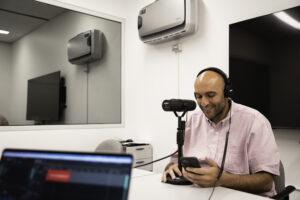How U of T’s pharmacy faculty unlocks the marcomm potential of podcasts
By Ruba Hassan | June 28, 2023

Higher education communicators are always on the lookout for new and innovative ways to reach prospective students, promote their schools and maintain strong connections with their communities. For the University of Toronto’s Leslie Dan Faculty of Pharmacy, a podcast was the way to go.
Using this popular and versatile medium, the faculty produces the I’m Pharmacy Podcast, an award-winning production used to promote its important work.
I’m Pharmacy recently wrapped up its third season, “Big Problems, Bigger Solutions”, which focused on national health-care issues. The season had people tuning in not just from Canada, but from the United States, the United Kingdom and Australia. To cater to this growing audience, Steve Southon, digital communications and social media specialist at the faculty, says the topic for the next season may expand to explore global health issues.
Setting goals and identifying target audiences
I’m Pharmacy originated as a faculty member’s grant-supported project to collaborate with students on creating a podcast. Southon helped with the technical aspects needed to bring the project to life.
The first season covered a variety of topics relevant to current students, such as professional growth, student experiences and hot topics in pharmacy practice.
Seeing the high marcomm potential of this project, Southon and his team revamped the podcast with a new strategy. The second season had a single theme: exploring the lifecycle of a drug, from discovery to safety and access. Their primary goal was to spotlight the work of researchers in the faculty.
“A lot of people at U of T, and probably throughout Ontario, know that we train pharmacists,” Southon says. “But there’s also a lot more that happens at our faculty.”
Southon, who produces and edits the podcast, adds that this platform gives faculty members who might not get many opportunities to share their research with a more general audience a chance to talk about their work and its real-world impacts.
Another goal for the podcast was to market the faculty to prospective and graduate students. Southon shared that the podcast allows researchers to succinctly talk about their work via a medium that is much more compelling to students than reading information on a university website.
Finding a narrative structure
One of the most challenging elements the I’m Pharmacy team, consisting of Southon; host Mina Tadrous; and director of communications Kate Richards, faced was determining a suitable narrative structure to allow discussions to flow.

“We wanted to make our guests comfortable talking about their work in a way that doesn’t seem like they’re just reading something, in order to get a really authentic-sounding conversation,” Southon says.
Each episode starts with Tadrous, who is also an assistant professor specializing in drug safety and health services research, contextualizing the topic and posing questions to the guests.
In the beginning, these guests were individuals from the Faculty of Pharmacy that the team wanted to promote. However, thanks to the popularity of the podcast, Southon says they have been able to expand the guest list to include experts from other U of T faculties, local health professionals and even leaders from Ontario Health.
At the end of each episode, Tadrous summarizes the insights shared and offers his final thoughts.
“We found that this was a really great way to tackle robust topics and show that we have so many folks in different areas navigating them in our faculty,” Southon says.
Key learnings
For other higher ed communicators wanting to introduce a podcast for their faculty, Southon advises keeping three things in mind.
While the technical side might seem daunting for those with no background in producing podcasts, Southon says it shouldn’t be. All you need are two high-quality microphones and recording software, he says. He also recommends recording interviews live, as opposed to virtually, to achieve better quality.
Having a compelling narrative structure that isn’t tiresome for the listener is also a must, he says. To develop your own, he suggests studying those used in podcasts you love and identifying the styles that fit best for your subject matter.
Lastly, choosing the right host is also crucial, Southon says. Tadrous, he says, possesses fantastic interviewing skills, and is enthusiastic about reaching out to high-profile guests for interviews.
“You need to look at who you can have as a host who will be a driving force in promoting your podcast.”